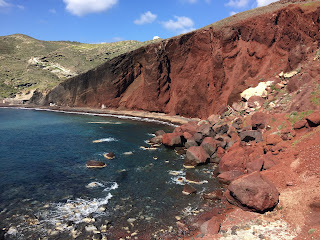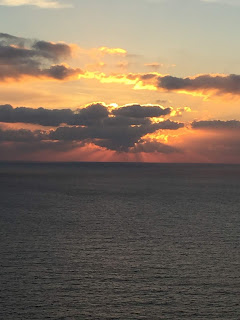For every person,
there is a first time to do something. And there is a last time.
We celebrate so many
of those firsts: the first day of school, the first time driving a car, the
first kiss, the first time having sex. We write stories and songs about them.
For many of the firsts, we record them forever in photographs or videos (not
the first sex, usually).
I still have a
fleeting memory of my first day of school so many years ago. I remember being
excited and not able to understand why so many other kids were crying and
afraid. I remember my first kiss quite clearly, and I also remember my first
good kiss (often the two are not the same). My first time potting a goal in a
real hockey game is etched in my mind as well.
I will always
remember the first girl I fell in "love" with as a teen and how that feeling
absolutely carried me away. And I will never forget the pain of the first time I had my heart crushed.
Like so many music
lovers, I remember the first time I heard some of my favorite songs and albums.
As a kid, I remember listening to Sgt.
Pepper’s Lonely Hearts Club Band for the first time and being completely
blown away. Some other songs really hit me the first time I heard them: CSN’s Suite: Judy Blue Eyes, Led Zeppelin’s Stairway to Heaven, Lynyrd Skynyrd’s Free Bird, Fleetwood Mac’s Go Your Own Way, Phil Collins’s I Don’t
Care Anymore, Don Henley’s Heart of the
Matter, John Hiatt’s Have a Little
Faith in Me, and John Mayer’s Dreaming
with a Broken Heart, just to name a few. I have listened to them hundreds
of times, but I will always remember the first.
We remember things
like the first time flying in a plane, the first time visiting a foreign
country, the first time seeing the ocean (unless we went to the ocean all the
time practically from birth, as I did), the first time getting drunk (well, we
don’t always remember it well), the first time getting a paycheck, and so much
more.
First times are so
memorable because they bring something new into our lives and often mark
significant changes, rites of passage. And they can spark strong emotions,
sometimes even explosions of emotion. These first times usually change us in
some way; sometimes the ways are small, and sometimes they are huge.
First times more
often happen in our childhood, our youth, our early adulthood – times that are
the most optimistic in our lives. And they help fuel that optimism, give it
form and direction, even when they hurt a bit.
The Last Time
But for every first
time, there is also a last time.
We don’t think much
about last times, and we don’t celebrate them. And why would we? Last times
speak to finality, to reaching the end, and perhaps to death itself. We tend to
associate last times with our last years, with diminishing abilities, and often
with missed opportunities and regrets.
For most of our
lives, we don’t really think about last times because we consider ourselves
pretty much immortal and believe that there will, or at least can, always be a
“next time.” Besides, we can never really know when the “last time” will really be the last.
Maybe thinking about
the last time is a manifestation of getting older, but I do sometimes find
myself wondering what song will be the last one I ever hear, what movie might
be the last I ever see. I don’t think about this often, but it does cross my
mind from time to time.
Have you ever spent
time with a person, said goodbye, and wondered if you had just seen that person
for the last time? What about other things we do routinely in life? Have you
ever had a moment when you haven’t done a particular thing for a while and
wondered whether you had done it for the last time ever?
Probably not. As I
mentioned, we generally assume there will be a next time, even if we haven’t
done that thing for while. But as we get older, the likelihood that there won’t
be a next time increases.
Of course, our last
times could come at any time. We never know when fate might whisk us away from
this life. In this modern age, we are more likely than ever before to make it
into our 70s, 80s or even our 90s. And some people get to those ripe old ages
in pretty good condition, so they manage to extend their next times beyond when
many would have had their last times.
But we all know of
people who passed away in their 20s or 30s, or sometimes even earlier. Sometimes
their first time is their last time. Sometimes they never have a first time at
all.
The point is that we
really never know when the last time will be. If you haven’t kissed a woman for some time, you might still be
confident that there will be a next time. Or you might look at your life and
conclude that you truly have already experienced the last time.
The last time I saw my mother, I had no idea that it really would be the last time. Several years passed
as I lived in Colorado and she had become increasingly ill in Massachusetts. I also
didn’t imagine that the last time we spoke on the phone before Christmas would
be the last time we would talk, as she went into a coma shortly after New Year
and passed away six months later. Of course, if we could know these things, we
would react differently. But we can’t know.
When I was in my
early 20s, I had a best friend when I was stationed on Guam. Frank and I were
like brothers, and when my time on the island was up and I left, I naively assumed
we would meet up again before long. We never did. It was the last time, and I
learned a valuable lesson about how fleeting friendship can be.
More and more, I see
that I have already had my last times in many things and that in other things,
the last time is not far off. I used to run long distances, but knee damage and
back problems stopped that. I don’t even remember when the last time was. I
never could have imagined that I played my last game of hockey before I was 30
or that when I played softball one summer night almost two decades ago, it was
my last time. I will never do those things again.
I am quite sure that
I have known love for the last time in my life, and the sad thing is that I
never really knew it well. Although I love someone even now, it can never be
mutual, I will never feel its warmth. But that’s been my fate, apparently – the
lesson I was meant to learn in this life.
The time is probably
not far off when I will have driven a car for the last time. Driving is so important to me that to not be able to do that may feel like the last straw,
like I am truly done. But it’s not here yet… so there is that.
The other day I said
goodbye to a friend after a usual, casual meeting, and for some reason the
thought occurred to me that I might have just seen her for the last time. I
certainly hope not.
None of us really
knows when the last time will be or if it has already occurred. That is the
mystery. And I suppose we need that mystery in our lives. Or maybe we need to
just not think about it.
I hope this won’t be
the last time I will write a blog post.
--------------------------------------












